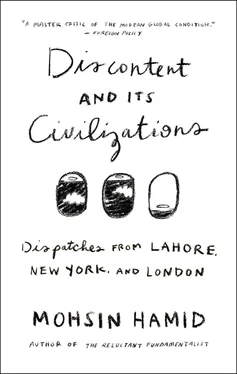I find it difficult to imagine a better description of many of our TV talk show hosts — or much of our public discourse — today.
There are three main political positions we hear over and over in Pakistan, and all three are suffused with doublethink. There is the national security position: “America is our enemy; America should give us more aid.” The privileged liberal position: “There should be equal rights for all; I should not have to share my riches with the poor.” And the (remarkably similar) ambitious cleric position: “Religion makes us all equal; only I decide what religion says.”
It is unsurprising that the privileged liberal position is the one most often associated with attempts to protect the rights of religious minorities in our country. It is also unsurprising that it has been largely unpersuasive.
The good news, from a religious minority standpoint, is that the other positions are equally incoherent. (The bad news is that they are much more willing to resort to violence in support of their arguments.)
What Pakistan’s religious minorities need, therefore, is a new position, a position that champions equality while, and this is the tricky part, also championing equality. In other words, a position that dispenses with the illusion that equality can be enhanced in a society prostrate before either its rich or its clerics.
Such a position would also be to the benefit of the country’s economic majority, its poor. For they, too, are looked down upon, discriminated against, physically threatened, and not infrequently killed. They, too, are second-class citizens. They, too, have been actively oppressed by our state.
At its heart, our country’s toxic treatment of its religious minorities is intertwined with its toxic treatment of its impoverished majority. Both groups suffer from the denial of our common humanity. And that, paradoxically, offers great hope. For we can reject false dichotomies between our clerical and our liberal positions, between our minorities and our majority. We can begin the search for common ground that has eluded us as a nation thus far.
We might, for example, shift from disputes over blasphemy laws to actually delivering due process of law, from arguments over curbing radical madrassas to actually building a high-quality state education system, from alternately buying off and fighting tribal chieftains to actually empowering local tribespeople.
Our problems are not insurmountable. Pakistan is, simply put, a land that mistreats its minorities and its majority. It is ripe for a revolution, except that it already has many trappings of democracy: elected assemblies, free media, independent judges. A revolution in our thinking and behavior, brought about by sustained pressure from below, is what is really called for.
Let us be clear: the messy but effective compromises we require can only come about through the dramatically improved functioning of our democracy. But a better-functioning democracy is feared by many with vested interests who benefit from the impaired system we currently have. They must be convinced otherwise.
Above all, we must convince our powerful national security state. Rationally, it is clear that under our current policies, Pakistan is becoming ever less secure. The stability and growth that a well-functioning democracy could bring is our country’s best chance of escaping from its “eagerly-dependent-on-enemy-America” strategic incoherence. Unless, that is, our national security doublethink really boils down to this: “I will protect you; you are the threat.”
For the sake of our vulnerable, which is to say, in different ways, just about all of us, I hope this is not the case. Too much Pakistani blood has already been shed and too many Pakistanis have already gone to bed hungry.
(2011)
AS NEWS OF terrorist leader Osama bin Laden’s death reverberates in Pakistan, embassies here are shutting down, hotels are ramping up security, restaurants are reporting canceled reservations, and public gatherings like plays, concerts, and lectures are being postponed. The feeling in Lahore is familiar: it is like the dread that lingers over the city in the days after it has suffered a massive terrorist attack.
This time, though, the attack has not yet happened, and the dread spans the entire country. Pakistanis know they may pay a blood price for Bin Laden’s killing. A purported mirror has been broken. Bad luck is to be expected.
Yet as I speak to friends and visit the market there is resignation as well. After a decade of slaughter, many here feel that terrorists are already striking Pakistan as hard as they can, and moreover that al-Qaeda is no longer as powerful as other militant groups. The most common sentiment I hear is that nothing much will change.
That depends, of course, on how the US responds. Barack Obama noted in his speech that “counterterrorism cooperation with Pakistan helped lead us to Bin Laden and the compound where he was hiding.” But he also said that “a small team of Americans carried out the operation” itself. Between these two assertions is a gap open to a horde of questions.
For Bin Laden was not killed in the tribal areas near the Pakistan-Afghanistan border. He was killed in Abbottabad, a place I last visited a few years ago. In my childhood, Abbottabad was known as a pleasant hill station, a rest stop not far from Islamabad along the fabled Silk Road that winds its way to China through the mighty Karakoram and Himalaya mountains. Rampant population growth and climate change have seen its desirability as a tourist destination decline.
But while well-off Pakistani tourists no longer flock to Abbottabad as they once did, it remains famous in the country for its proximity to the Pakistan Military Academy, located just a few kilometers away. Hunting down a wanted terrorist in Abbottabad is, in American or British terms, like hunting him down near West Point or Sandhurst.
So a debate is raging in Pakistan over what really happened. Conspiracy theories abound. Some say that Pakistani intelligence agencies uncovered Bin Laden but wanted the US to take responsibility for his killing in order to blunt a possible backlash against Pakistan. Others argue that it is inconceivable that US helicopters could have penetrated so deeply into Pakistani airspace without being detected by the Pakistan army and air force (in the past, US helicopter incursions near the Afghanistan border have been turned back with warning shots), and therefore the operation must have been jointly authorized.
But there are other, truly frightening theories, such as that even in a town with as dense a military presence as Abbottabad, Bin Laden managed to elude Pakistani security forces, suggesting a remarkable degree of incompetence. More terrifying still would be if there were official complicity in harboring him, putting Pakistan on a collision course with the US. Pakistanis must hope that neither of these is true.
Because Pakistan is suffering badly. Crowds are justifiably celebrating Bin Laden’s death in downtown Manhattan, where a decade ago al-Qaeda terrorists infamously massacred nearly three thousand people.
But since the subsequent US invasion of Afghanistan, terrorists have killed many times that number of people in Pakistan. Tens of thousands have died here in terror and counterterror violence, slain by bombs, bullets, cannons, and drones. America’s 9/11 has given way to Pakistan’s 24/7/365. The battlefield has been displaced. And in Pakistan it is much more bloody.
If Osama bin Laden’s death means that the war in south and central Asia can now begin to end, that America can begin to withdraw its forces from the region, and that Pakistan and Afghanistan can somehow rediscover peace, then one day there may be celebrations here as well.
Читать дальше












